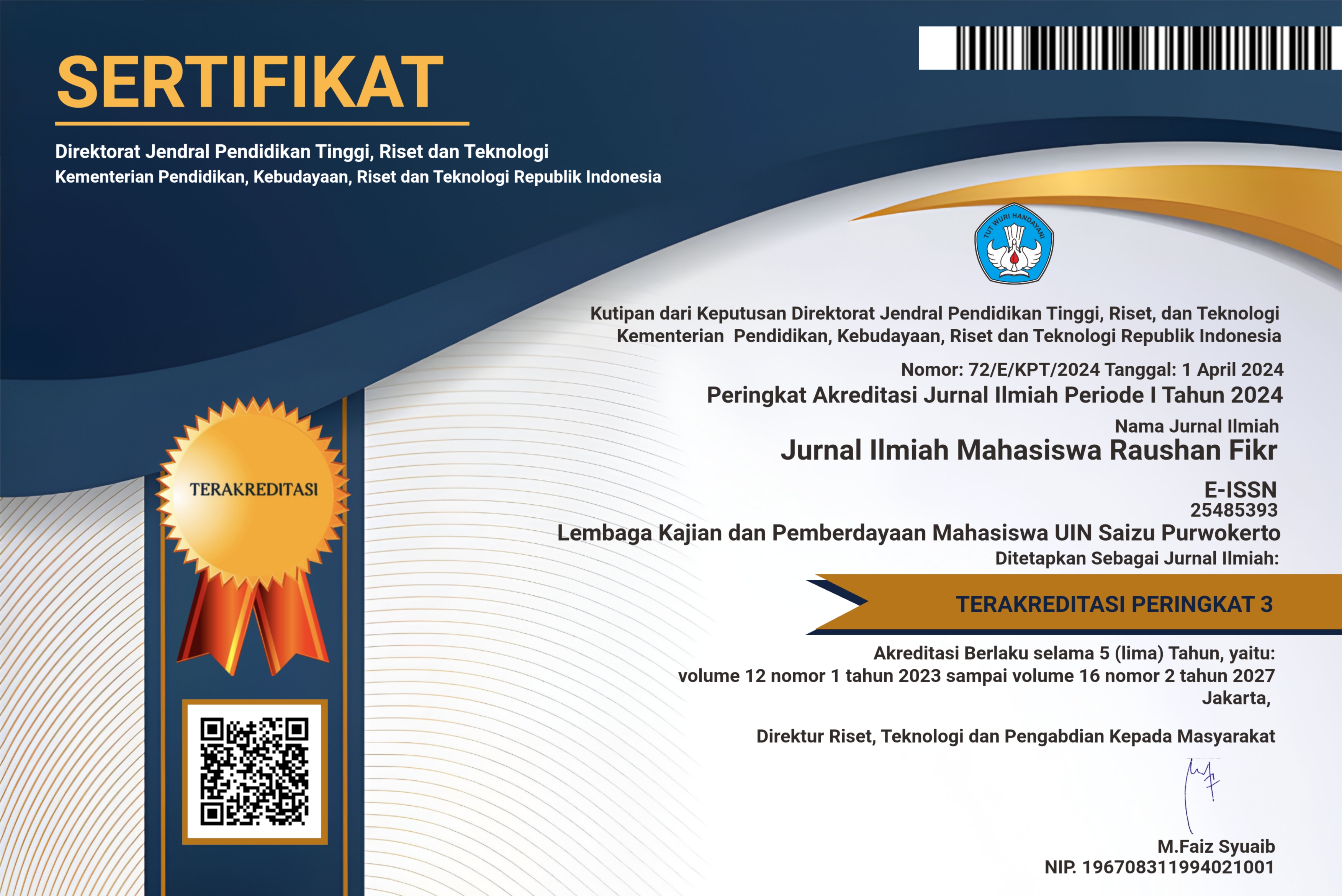Pendidikan Karakter dalam Islam: Analisis Filosofis Ibnu Miskawaih dalam Kitab Tahzibul Akhlak
DOI:
https://doi.org/10.24090/jimrf.v10i1.4684Keywords:
Ibnu Miskawaih, Pendidikan, KarakterAbstract
Character education aims to direct students who have good morals. The human existence character mostly comes from the environment, such as innate, culture, and education received. Because the human character is always changed, the path is taken through the educational process, namely upbringing, and training. On the way, the student characters can experience a decrease and even deviations in space. This condition can be influenced by the environment around them. This study aims to find out how the concept of character education according to the Islamic figure, namely Ibnu Miskawaih through his book entitled "Tahdzibul Akhlak", and its relevance to education in Indonesia.This qualitative descriptive research uses content analysis technic of various documents as primary and secondary sources. In conclution, Ibn Miskawaih belongs to the Dualist-Active perspective argues that human character is built by his environment and the purpose of character education is to achieve virtue and happiness. The relevances of this topic with Indonesia education are in the subject of character and community service programs.Downloads
References
Erviana, V. Y. (2021). Penanganan Dekadensi Moral melalui Penerapan Karakter Cinta Damai dan Nasionalisme. Jurnal Penelitian Ilmu Pendidikan, 14(1), 1–9.
Fikri, A. (2019). Pengaruh Globalisasi dan Era Disrupsi terhadap Pendidikan dan Nilai-Nilai Keislaman. Sukma: Jurnal Pendidikan, 3(1), 117–136.
Indonesia, P. R. (2003). Undang-undang Republik Indonesia nomor 20 tahun 2003 tentang sistem pendidikan nasional. Departemen Pendidikan Nasional.
Larasati, A. W., Mansur, R., & Jazari, I. (2019). Pemikiran Sufistik Imam Al-Ghazali (Studi Analisis dalam Kitab Al-Munqidh min Adh-Dhalal). Vicratina: Jurnal Pendidikan Islam, 4(3), 10–17.
Maragustam. (2018). Pembentukan Karakter Anak Bangsa (Perspektif Filsafat Pendidikan Islam). Pascasarjana FITK UIN Sunan Kalijaga.
Maragustam. (2020). Filsafat Pendidikan Islam Menuju Pembentukan Karakter. Pascasarjana FITK UIN Sunan Kalijaga.
Maragustam. (2015). Paradigma Revolusi Mental Dalam Pembentukan Karakter Bangsa Berbasis Sinergitas Islam Dan Filsafat Pendidikan. Jurnal Pendidikan Agama Islam, 12(2), 161–175.
Miskawaih, I. (1994). Menuju Kesempurnaan Akhlak, terj. In Helmi Hidayat. Bandung: Mizan.
Mulia, H. R. (2019). Pendidikan Karakter: Analisis Pemikiran Ibnu Miskawaih. Tarbawi: Jurnal Ilmu Pendidikan, 15(1), 39–51.
Permendikbud Nomor 23 Tahun 2003 Tentang Penumbuhan Budi Pekerti. (n.d.).
Rahmaniyah, I. (2010). Pendidikan etika: Konsep jiwa dan etika perspektif Ibnu Miskawaih dalam kontribusinya di bidang pendidikan. UIN-Maliki Press.
Saodah, S., Amini, Q., Rizkyah, K., Nuralviah, S., & Urfany, N. (2020). Pengaruh Globalisasi terhadap Siswa Sekolah Dasar. Pandawa, 2(3), 375–385.
Sa'adah, A., & Hariadi, M. F. (2020). Pemikiran Ibnu Miskawaih (Religius-Rasional) Tentang Pendidikan dan Relevansinya di Era Indsutri 4.0. Jurnal Penelitian Keislaman, 16(1), 16–30.
Setiawan, D. (2013). Peran pendidikan karakter dalam mengembangkan kecerdasan moral. Jurnal Pendidikan Karakter, 1.
Unayah, N., & Sabarisman, M. (2016). Fenomena kenakalan remaja dan kriminalitas. Sosio Informa, 1(2).
Downloads
Published
How to Cite
Issue
Section
License
Authors who publish with this journal agree to the following terms:
- Authors retain copyright and grant the journal right of first publication with the work simultaneously licensed under a Creative Commons Attribution-NonCommercial-ShareAlike 4.0 International License that allows others to share the work with an acknowledgement of the work's authorship and initial publication in this journal.
- Authors are able to enter into separate, additional contractual arrangements for the non-exclusive distribution of the journal's published version of the work (e.g., post it to an institutional repository or publish it in a book), with an acknowledgement of its initial publication in this journal.
- Authors are permitted and encouraged to post their work online (e.g., in institutional repositories or on their website) prior to and during the submission process, as it can lead to productive exchanges, as well as earlier and greater citation of published work (See The Effect of Open Access).
















